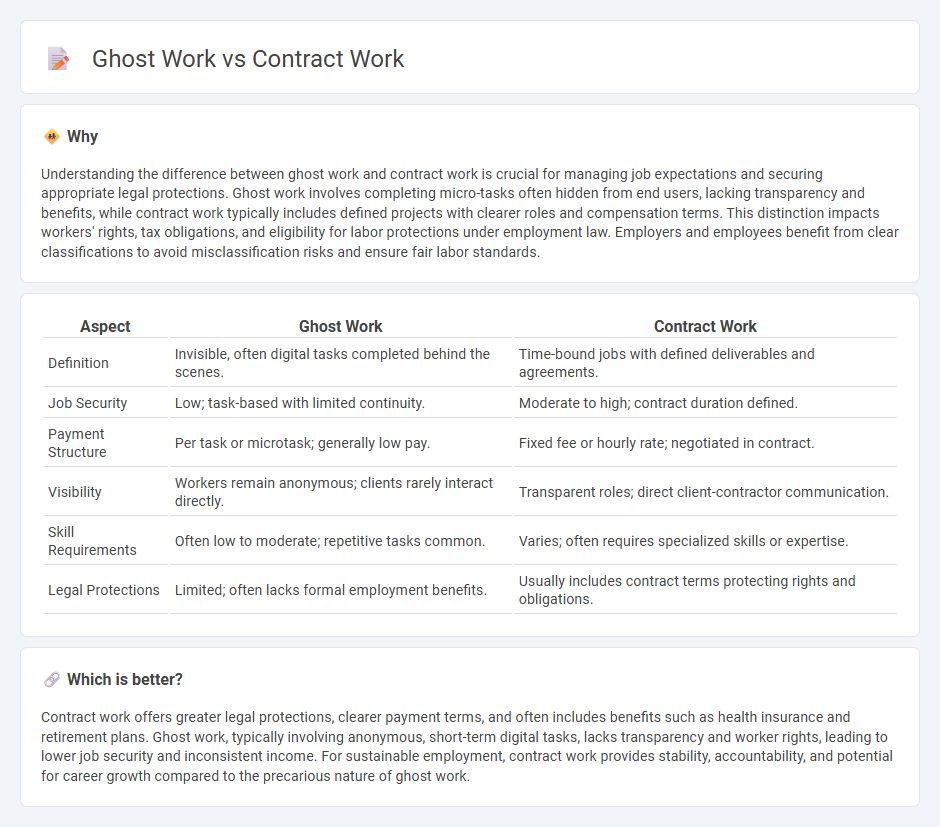
Ghost work involves performing tasks for digital platforms or businesses without public recognition or direct interaction with clients, often through microtasking or crowdsourcing models. Contract work typically entails a formal agreement for specific projects or periods, offering clearer job descriptions, pay structures, and often greater legal protections compared to ghost work. Discover the nuances between these employment types and how they shape the modern workforce.
Why it is important
Understanding the difference between ghost work and contract work is crucial for managing job expectations and securing appropriate legal protections. Ghost work involves completing micro-tasks often hidden from end users, lacking transparency and benefits, while contract work typically includes defined projects with clearer roles and compensation terms. This distinction impacts workers' rights, tax obligations, and eligibility for labor protections under employment law. Employers and employees benefit from clear classifications to avoid misclassification risks and ensure fair labor standards.
Comparison Table
| Aspect | Ghost Work | Contract Work |
|---|---|---|
| Definition | Invisible, often digital tasks completed behind the scenes. | Time-bound jobs with defined deliverables and agreements. |
| Job Security | Low; task-based with limited continuity. | Moderate to high; contract duration defined. |
| Payment Structure | Per task or microtask; generally low pay. | Fixed fee or hourly rate; negotiated in contract. |
| Visibility | Workers remain anonymous; clients rarely interact directly. | Transparent roles; direct client-contractor communication. |
| Skill Requirements | Often low to moderate; repetitive tasks common. | Varies; often requires specialized skills or expertise. |
| Legal Protections | Limited; often lacks formal employment benefits. | Usually includes contract terms protecting rights and obligations. |
Which is better?
Contract work offers greater legal protections, clearer payment terms, and often includes benefits such as health insurance and retirement plans. Ghost work, typically involving anonymous, short-term digital tasks, lacks transparency and worker rights, leading to lower job security and inconsistent income. For sustainable employment, contract work provides stability, accountability, and potential for career growth compared to the precarious nature of ghost work.
Connection
Ghost work and contract work are connected through their reliance on flexible, on-demand labor models facilitated by digital platforms. Both types of employment involve task-based assignments often lacking traditional job security, benefits, and long-term commitments. This gig economy structure highlights the growing shift toward decentralized, remote, and contingent workforce arrangements.
Key Terms
Independent Contractor
Independent contractors engage in contract work by providing specialized services under agreed-upon terms without traditional employment benefits, distinguishing them from ghost workers who perform tasks often unacknowledged or unpaid. Contract work as an independent contractor offers flexibility, autonomy, and clear scope of projects, emphasizing legally defined roles and compensation structures. Explore the distinctions and benefits of independent contractor roles to optimize your professional engagements.
Gig Economy
Contract work in the gig economy involves freelancers or independent contractors engaging in specific projects with clear deliverables and timelines, often documented through formal agreements. Ghost work refers to invisible labor performed by individuals behind digital platforms, such as content moderation or data labeling, where workers' contributions are anonymized and undervalued despite being essential to artificial intelligence and platform functionality. Explore more to understand how these roles shape the evolving gig economy landscape.
Platform Labor
Platform labor divides into contract work, where workers engage in defined tasks with clear deliverables, and ghost work, characterized by invisible, often uncredited contributions supporting AI and digital services. Contract work offers transparency and direct compensation, whereas ghost work involves repetitive, low-wage tasks under opaque conditions, fueling the backend of platforms like content moderation and data labeling. Explore how these labor forms impact worker rights and platform accountability in the evolving gig economy.
Source and External Links
What Is a Contract Job, and How Does It Work in 2025? - Upwork - A contract job involves hiring a worker for a specific task over a set period and for a fixed amount, allowing flexibility for both businesses and professionals to meet temporary or project-specific needs.
Contractor Opportunities | The Cigna Group Careers - Contract positions at Cigna offer temporary assignments with potential transition to full-time roles, along with flexible work arrangements and possible benefits through the employer vendor.
Contract Jobs, Employment in Michigan | Indeed - A variety of contract jobs are available in Michigan, spanning from administrative and support roles to technical and sales positions, illustrating the range of opportunities in contract work.
 dowidth.com
dowidth.com